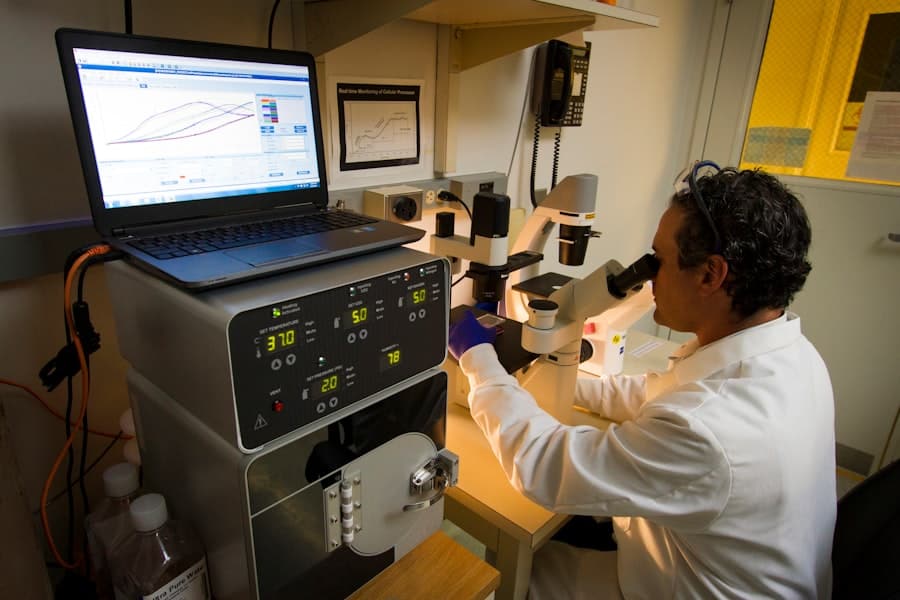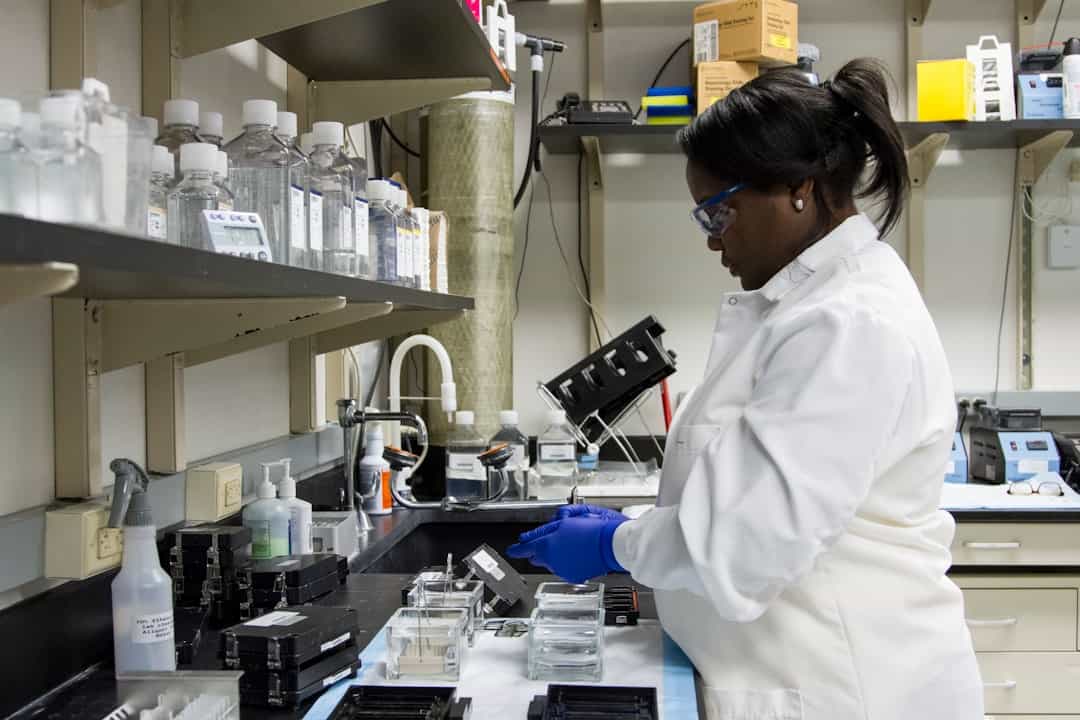The advent of artificial intelligence (AI) has ushered in a new era in various fields, and genomics is no exception. Genome mapping, the process of determining the location of genes and other important sequences within a genome, has traditionally been a labor-intensive and time-consuming endeavor. However, with the integration of AI technologies, researchers are now able to analyze vast amounts of genomic data with unprecedented speed and accuracy.
This transformation is not merely a technological upgrade; it represents a paradigm shift in how scientists approach the complexities of genetic information. AI’s ability to process and interpret large datasets makes it an invaluable tool in genome mapping. By employing machine learning algorithms, researchers can identify patterns and correlations that would be nearly impossible to discern through manual analysis.
This capability is particularly crucial given the sheer volume of data generated by modern sequencing technologies. As we delve deeper into the intricacies of human genetics, the role of AI in genome mapping becomes increasingly significant, promising to enhance our understanding of genetic diseases, evolutionary biology, and personalized medicine.
Key Takeaways
- AI is revolutionizing genome mapping by accelerating the process and improving accuracy.
- Current challenges in mapping complex human genomes include the vast amount of data and the need for advanced analytical tools.
- AI plays a crucial role in analyzing big data in genomics by identifying patterns and making predictions.
- Ethical considerations in AI-assisted genome mapping include privacy concerns and the potential misuse of genetic information.
- Future applications of AI in precision medicine include personalized treatment plans and early disease detection.
Current Challenges in Mapping Complex Human Genomes
Despite the advancements in technology, mapping complex human genomes remains fraught with challenges. One of the primary obstacles is the sheer size and complexity of the human genome itself. With approximately 3 billion base pairs and an estimated 20,000-25,000 genes, the human genome is not only vast but also highly intricate.
Variations such as single nucleotide polymorphisms (SNPs), insertions, deletions, and structural variations add layers of complexity that complicate the mapping process. These variations can have significant implications for health and disease, making accurate mapping essential. Another challenge lies in the limitations of current sequencing technologies.
While next-generation sequencing (NGS) has revolutionized genomics by allowing for rapid sequencing at lower costs, it still faces hurdles such as read length limitations and difficulties in accurately assembling repetitive regions of the genome. These technical constraints can lead to gaps in data or misinterpretations of genomic structures. Furthermore, the biological variability among individuals adds another layer of complexity; different populations may exhibit distinct genomic features that require tailored approaches for effective mapping.
How AI is Revolutionizing Genome Mapping

AI is fundamentally changing the landscape of genome mapping by introducing sophisticated algorithms that can learn from data and improve over time. Machine learning models can be trained on existing genomic datasets to recognize patterns associated with specific genetic traits or diseases. For instance, convolutional neural networks (CNNs) have been employed to analyze genomic sequences and predict gene functions based on sequence motifs.
This capability allows researchers to make informed predictions about gene behavior and interactions, significantly accelerating the mapping process.
For example, software platforms like DeepVariant utilize deep learning techniques to call variants from sequencing data with high accuracy.
By comparing the results against known genomic references, these tools can identify discrepancies and potential errors in sequencing data, thereby enhancing the reliability of genome maps. The automation of these processes not only saves time but also reduces human error, leading to more accurate and comprehensive genomic maps.
The Role of AI in Analyzing Big Data in Genomics
The explosion of genomic data generated by high-throughput sequencing technologies has created a pressing need for advanced analytical tools capable of handling big data. AI excels in this domain due to its ability to process large datasets quickly and extract meaningful insights. For instance, unsupervised learning algorithms can cluster genomic data based on similarities, revealing hidden relationships between genes and their functions.
This clustering can help identify gene networks involved in specific biological processes or diseases. Furthermore, AI can enhance predictive modeling in genomics by integrating diverse data types, such as genomic sequences, epigenetic modifications, and transcriptomic profiles. By employing techniques like multi-omics integration, researchers can gain a holistic view of biological systems and their interactions.
This comprehensive approach enables scientists to uncover complex regulatory mechanisms that govern gene expression and contribute to phenotypic diversity. As a result, AI not only streamlines data analysis but also enriches our understanding of the intricate web of genetic interactions.
Ethical Considerations in AI-assisted Genome Mapping
As AI continues to play a pivotal role in genome mapping, ethical considerations surrounding its use become increasingly important. One major concern is the potential for bias in AI algorithms, which can arise from training datasets that are not representative of diverse populations. If AI systems are trained predominantly on genomic data from specific ethnic groups, they may produce skewed results that do not accurately reflect the genetic diversity present in the broader population.
This bias could lead to disparities in healthcare outcomes and exacerbate existing inequalities. Additionally, the use of AI in genomics raises questions about privacy and data security. Genomic data is inherently sensitive, as it contains information about an individual’s health predispositions and familial relationships.
The integration of AI tools necessitates robust data protection measures to ensure that personal information is safeguarded against unauthorized access or misuse. Researchers must navigate these ethical challenges carefully to foster public trust and ensure that advancements in AI-assisted genome mapping benefit all segments of society equitably.
Future Applications of AI in Precision Medicine

The future applications of AI in precision medicine are vast and promising. Precision medicine aims to tailor medical treatment to individual characteristics, including genetic makeup, lifestyle factors, and environmental influences. AI’s ability to analyze complex datasets positions it as a key player in this field.
For instance, machine learning algorithms can be employed to predict patient responses to specific treatments based on their genomic profiles, enabling clinicians to make more informed decisions regarding therapeutic interventions. Moreover, AI can facilitate the identification of novel biomarkers for disease susceptibility and progression. By analyzing large-scale genomic datasets alongside clinical outcomes, researchers can uncover genetic variants associated with particular diseases or treatment responses.
This information can lead to the development of targeted therapies that are more effective for specific patient populations. As AI continues to evolve, its integration into precision medicine will likely enhance our ability to prevent, diagnose, and treat diseases more effectively.
Collaborations between AI and Human Experts in Genome Mapping
While AI offers powerful tools for genome mapping, the collaboration between AI systems and human experts remains essential for achieving optimal results. Human expertise is invaluable in interpreting complex genomic data and providing context that algorithms may lack. For example, geneticists possess deep knowledge about gene functions and interactions that can guide AI models in making more accurate predictions.
This synergy between human intuition and machine learning capabilities creates a more robust framework for understanding genomic information. Furthermore, interdisciplinary collaborations are becoming increasingly common as researchers from diverse fields come together to tackle complex genomic challenges. Bioinformaticians, geneticists, computer scientists, and clinicians are pooling their expertise to develop innovative solutions that leverage both AI technologies and human insights.
Such collaborations not only enhance the quality of genome mapping but also foster a culture of knowledge sharing that drives scientific progress forward.
The Impact of AI on the Future of Genomic Research
The impact of AI on genomic research is profound and far-reaching. As researchers continue to harness the power of AI technologies, we can expect significant advancements in our understanding of genetics and its implications for health and disease. The ability to analyze large datasets quickly will accelerate discoveries related to gene functions, disease mechanisms, and potential therapeutic targets.
This acceleration could lead to breakthroughs that were previously thought unattainable. Moreover, as AI tools become more sophisticated and accessible, they will democratize genomic research by enabling a broader range of scientists to engage with complex datasets. This democratization has the potential to foster innovation across various sectors, from academia to industry, ultimately leading to improved healthcare outcomes worldwide.
The future of genomic research will likely be characterized by an increasingly collaborative environment where AI serves as a catalyst for discovery and understanding in the ever-evolving field of genomics.
In a related article discussing the latest advancements in technology, com/owned-by-vox-media-recode-is-a-technology-news-website/’>Recode explores the ever-evolving landscape of tech news and innovation.
As we delve deeper into the future of AI in mapping complex human genomes, it is crucial to stay informed about the latest developments in the tech industry. Whether it’s finding the best laptops for graphic design or navigating the installation of Windows 11 without TPM, staying up to date with technology news is essential for understanding the potential impact of AI on genomics.
FAQs
What is AI?
AI, or artificial intelligence, refers to the simulation of human intelligence in machines that are programmed to think and act like humans. This includes tasks such as learning, problem-solving, and decision-making.
What are complex human genomes?
Complex human genomes refer to the unique genetic makeup of an individual, including variations and mutations in their DNA that can impact their health, traits, and susceptibility to diseases.
How is AI used in mapping complex human genomes?
AI is used in mapping complex human genomes to analyze large amounts of genetic data, identify patterns and variations, and predict potential health outcomes. This can help researchers and healthcare professionals better understand genetic diseases and develop personalized treatment plans.
What are the benefits of using AI in mapping complex human genomes?
Using AI in mapping complex human genomes can lead to more accurate and efficient analysis of genetic data, which can ultimately improve our understanding of genetic diseases, facilitate the development of targeted therapies, and enable personalized medicine.
What are the challenges of using AI in mapping complex human genomes?
Challenges of using AI in mapping complex human genomes include the need for large and diverse datasets, ensuring data privacy and security, and interpreting the complex interactions between genes and environmental factors. Additionally, ethical considerations surrounding genetic testing and data usage must be addressed.

